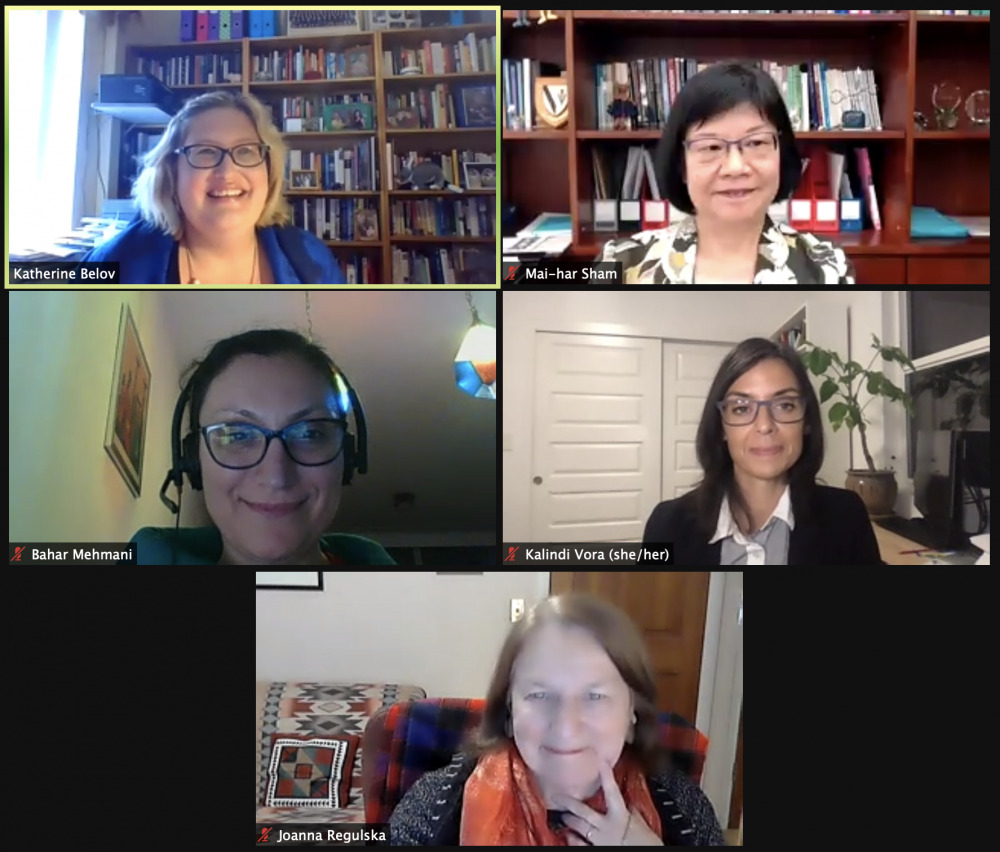APRU and the University of Sydney on Dec 2 Hong Kong time hosted the webinar Impact of Covid-19 on Women in Higher Education to share the network’s latest research on how the COVID-19 lockdowns across the world have been affecting gender equality in the academic realm.
Held under the APRU Asia Pacific Women in Leadership Program (APWiL), the virtual event featured leading researchers discussing the challenges that women face during the lockdown and strategies to overcome barriers to publishing, forging new research partnerships, and establishing funding. The discussion raised important questions about how research outputs are calculated in consideration for tenure and other career milestones.
Moderator Professor Katherine Belov, The University of Sydney Professor of Comparative Genomics and Pro Vice-Chancellor Global Engagement, School of Life and Environmental Sciences, raised the curtain with noting that the OECD recently pointed out that women fuel the fight against COVID-19, making up almost 70% of the health care workforce and making them more vulnerable to infection.
“At the same time, women are also shouldering much of the burden at home, given school and child care facility closures and longstanding gender inequalities in unpaid work,” Belov said.
“And our own colleagues, women in academia, have suffered a similar fate, with research outputs plummeting during lockdown while men’s have increased,” she added.
Dr. Bahar Mehmani, Reviewer Experience Lead in the Global STM journals at Elsevier, presented her latest survey illustrating that a wave of academic publications during the pandemic came mainly to the benefit of male researchers’ careers. In Feb-May, the number of publications submitted to Elsevier increased by a whopping 90% compared to the same period of 2019, compelling Mehmani’s team to look at the submitters’ names in order to guess their gender.
The data exposed that while submission increased in all months during the lockdown period, the growth of submissions by female researchers accelerated significantly slower than those by male researchers. Growth was even slower in the late stage of female academics’ careers, leading Mehmani to conclude that especially female researchers in middle age bracket are penalized by closures of their children’s schools.
According to Mehmani, this is bound to strengthen long-lasting gender inequalities in the academic world; those who have already benefitted from COVID-19 research inflation may have higher chances in future to receive prestigious grants and obtain tenures and promotions in prestigious institutions.
“Flagging, carefully pondering or even disregarding COVID-19 related publications and citations from applicants’ assessments must be considered,” Mehmani said.
“Institutional interventions, such as promoting a more diverse, inclusive, and equitable working environment and embracing a family friendly leadership policy in the reopening plans of laboratories and institutes, could help moderate the distortions caused by the pandemic,” she added.
Mehmani’s presentation was followed by that of Professor Mai-har Sham, Pro-Vice-Chancellor / Vice-President, Choh-Ming Li Professor of Biomedical Sciences, The Chinese University of Hong Kong (CUHK). Sham shared her research on the situation in Hong Kong and introduced CUHK’s support measures for female academics who are adversely affected by the pandemic.
Professor Kalindi Vora, Director of Feminist Research Institute and Professor of Gender, Sexuality and Women’s Studies and Director of the Feminist Research Institute of UC Davis shared perspectives considering how women and women of color are impacted by Covid-19, with already drastic underrepresentation of women and black women in tenure positions, there are additional strains due to caretaking that widen the gender gap even further. Professor Vora shared important initaitves that the Feminist Research Center is taking to provide support such as Addressing Privilege and Anti-Blackness in Research Culture project and ADQ Scholar and Research Training Series.
The Asking Different Questions project is funded by the National Science Foundation Innovations in Graduate Education grant (Co-PIs Sara Giordano, Sarah McCullough, and Kalindi Vora). This project explores the following hypothesis: That changing research questions and research agendas will change who is in STEM and the knowledge we produce. The award will provide graduate students with training to locate their research questions within a larger societal context. This will include how to recognize and address issues of historical bias and cultural complexity. By learning to place their research in a broader context, junior researchers are able to better frame complex research questions, particularly those presented by communities traditionally under-served by science. The curriculum also provides support for interdisciplinary collaborations and the inclusion of diverse voices and approaches in STEM research.
Professor Joanna Regulska, Vice provost and Dean of Global Affairs and Professor of Gender, Sexuality and Women’s Studies, UC Davis reminded participants that there is great potential as part of the APRU network to use our collective knowledge and resources to expand impact in the region. One such opportunitiy is the APRU APWiL Mentoring Program which has just begun its pilot in 2020.
More information on the event page
For more information about the Asia Pacific Women in Leadership program contact [email protected]

